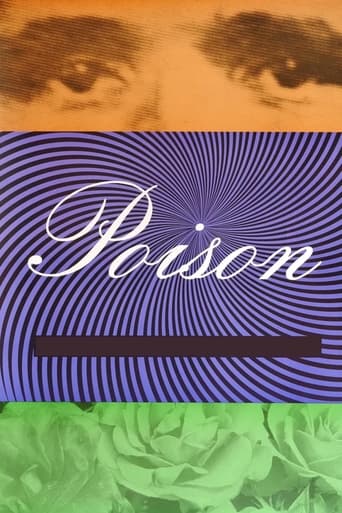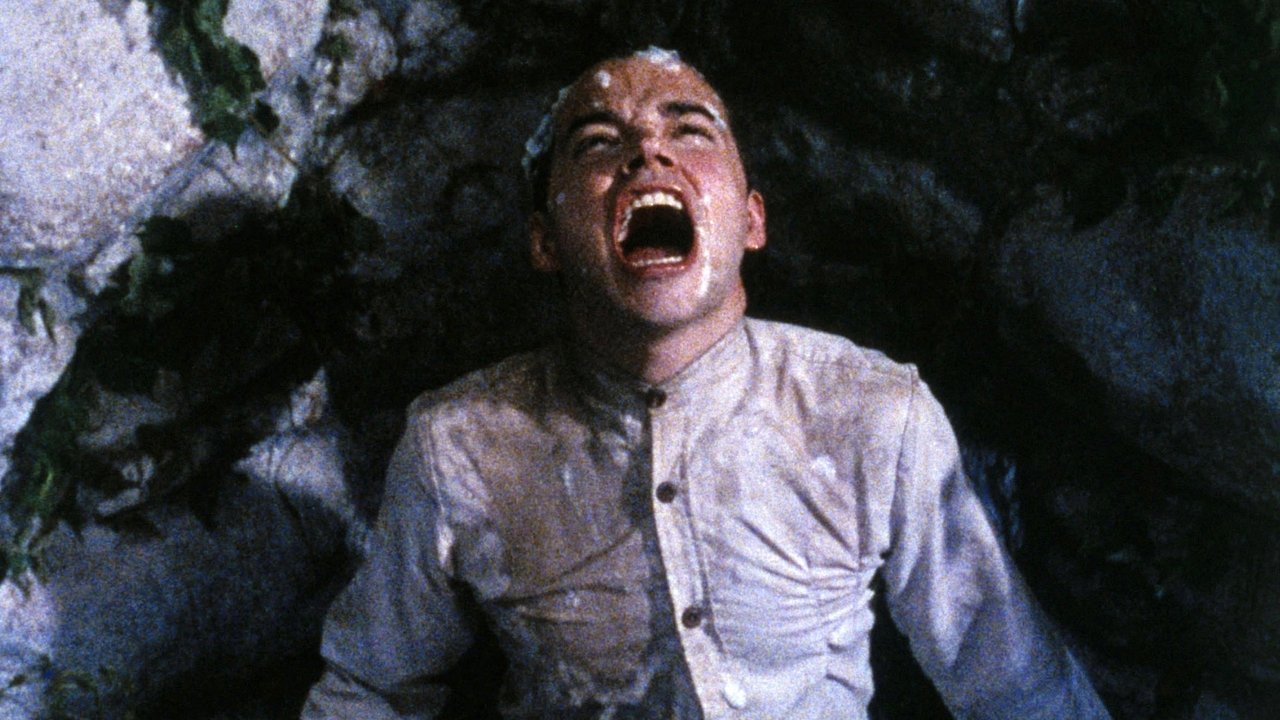Merwyn Grote
One of the things that writer-director Todd Haynes tries to do in POISON has been done before and seldom, if ever, has it worked. The most infamous example is perhaps D.W. Griffith's intolerable INTOLERANCE, a 1916 silent film epic featuring four revolving stories, each from a different period in time, interlaced so that they keep interrupting each other. INTOLERANCE is seldom praised for its quality but more often remembered for the boldness of its effort and the critical and box office failure of its end results.In POISON, Haynes apes Griffith's foolhardiness as he tries to tell three stories (subtitled "Hero," "Horror" and "Homo") and he tries to tell them simultaneously, despite the fact the stories have nothing in common as far as narrative, style or point. Haynes tells his tales in tiny bite-sized chunks of scenes, cutting from one to another to another in an endless rotation. The result is less like powerful film-making than it is like trying to watch TV with the scan button on the channel changer hopelessly stuck. It is an insipid gimmick trying desperately to prove itself as innovative film-making.As such, POISON is more annoying than shocking, despite the material's obvious attempts to be controversial. Furthermore, the three stories themselves suffer, as none of them can gather momentum or maintain coherency or consistency. And certainly these stories could have used all the help they could get."Hero" is a story of domestic violence; told in retrospect, it is largely a series of talking-head interviews discussing the circumstances that led up to a 7-year-old boy killing his father, before jumping out a window and literally flying away. According to the boy's mother (who is the only witness, but should be the only suspect), she gave birth to an angel who came to rescue her from an abusive husband. It is told in the dour, deadpan style of a mock documentary, not unlike Woody Allen's TAKE THE MONEY AND RUN, though it's not nearly as cleverly done. If the subject matter wasn't so grim, it could be assumed the film is a comedy. As is, it has a joyless goofiness to it that doesn't really make any sense. At best, the story is a weird idea that's barely been given a chance to be anything else."Horror" is equally grim and joyless, even as it appears to be a parody of old black-and-white horror movies. A young and idealistic scientist is studying the biological secrets of sexuality and accidentally becomes infected with a virus that turns him into some sort of sexually contagious leper. The story wants to be a parable about the AIDS epidemic, I suppose; but Haynes' attempts at creating an analogy between science fiction and medical tragedy is undercut by his self-conscious awareness of old movies. His film-making technique strives to replicate the socially conscious "B" thrillers of the 1950's, like THE FLY or THEM, but the end result comes closer to the sincere, yet ludicrous D-level films of Edward Wood, only without the clumsy campiness that make them at least funny-bad.With "Homo," Haynes is playing closer to home and makes no obvious attempt to recreate an old movie genre, but that doesn't mean that this tale works any better. It deals with two inmates in a French prison who are reunited, having also been in juvenile detention as well. The story hints at it being a love story, but in the end it is about rape, humiliation and domination. Though POISON is considered a groundbreaking work in gay cinema, this vision of homosexuality is dark and violent. It is hard to judge the overall merits of "Homo" because, like the two other tales, it is so hacked up by incompetent editing (by Haynes himself) that it is devoid of any compelling passion.It can't be argued that Haynes lacks a strong eye for the visual; despite the low budget, each segment of the film looks great in its own way. But there is a certain cowardice in Haynes' films. He wants to deal with serious social issues, but he buries it all in inappropriate homages/parodies of genre films that trivializes rather than reinforces his messages. Just as he did in his later hit, FAR FROM HEAVEN, which dealt with racism and homophobia, he dilutes his material by resorting to some ill-fitting, superficial, bygone cinematic style. You sense that he feels compelled to somehow justify his love of old movies by loading them down with serious intentions. It's like he is afraid to either tackle issues head-on or to admit that he is a film geek at heart.Thus, he fails going in both directions: the serious social issues are cheapened by the movie campiness, while the fun of movie parody is chilled by pretensions melodrama. Like so many young filmmakers, Haynes relies on the safety of imitation in his film-making. Great filmmakers (like Spielberg, Woody Allen, etc.) outgrow this and find their own voice. Lesser filmmakers like Haynes (and Tarantino and De Palma and Lucas, etc.) don't even seem to try.
NateManD
Todd Haynes became well known with his film "Poison", which was successful at the Sundance film festival. What I like about "Poison" is that is not another stereotypical gay film. It contains three separate stories, all shown out of sequence. So it's like watching three bizarre surrealist films within one movie. One story "Hero" is a mockumentary which deals with a young boy and his abusive father. After killing his dad, he mysteriously flies away. Another story deals with a disease like epidemic, which seems to be symbolic of aids. This part is filmed in a style of a campy 50's sci-fi film. The man drinks some sort of potion and is given the disease. A colleague still loves him even though he's infected. Then the last story "Homo" deals with two men in prison and their homosexual relationship. These two guys have known each other from their youth and the one has flashbacks of the torment he has faced. "Poison" is a unique experimental masterpiece of queer cinema, reminiscent of Derek Jarmon. The film went through much controversy with its NC-17 rating. But really, there's R-rated films which are much worse. "Poison" is definitely not a film for everyone, but if your looking for something strange and different you'll probably enjoy it.
crash_into_me420
After reading a bit about Todd Haynes' "Poison" and the homosexual comparisons that people seem to only be drawing from it, I've come to the conclusion that it doesn't deserve to just be tagged as a seminal film of the "new queer cinema". It's so much more than that.First of all, I found "Homo" to be the least intriguing of the 3 stories. "Hero" is actually more disturbing, showing the sudden disappearance of a mentally-inflicted, patricidal child who, according to his mother, was sent from the angels. I was particularly impressed by Haynes' creative use of layering in the adultery and spanking scenes.But, in blending three prominent aspects (color, black and white, documentary) of the film medium into his film, the beautiful b&w "Horror" is the most notable, showing the sudden downfall of a scientist's prosperity. Haynes conveys the scientist's hysteria to his audience by using slanted, extreme close-up camera techniques and spastic editing, not to mention a haunting soundtrack.The film is a bizarre one, indeed... but undeniably artful, and it certainly doesn't deserve to simply be pigeonholed into nothing more than a cornerstone for homosexual cinema.
FilmBoy999
I was excited about seeing this because I loved Safe and Velvet Goldmine, but this was just a bizarre bizarre piece of filmmaking. There are I suppose points to be made about the unreasonable fear of the AIDS virus which emerge in the story about the man who drinks the sex drive and becomes a leper, but they weren't so amazingly poignant. Haynes denies that this sequence connects with AIDS of course, so who knows. The story that was the most interesting was the mockumentary about the boy who kills his father, but the structure of the film as three stories proceeding in succession prevents you from really getting interested or emotionally involved in the movie. I didn't know what was so offensive about the prison scene, I just found it boring, as well as the rest of the film.



 AD
AD




